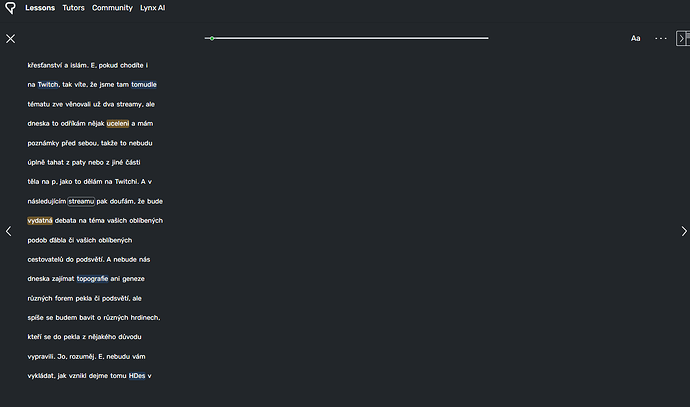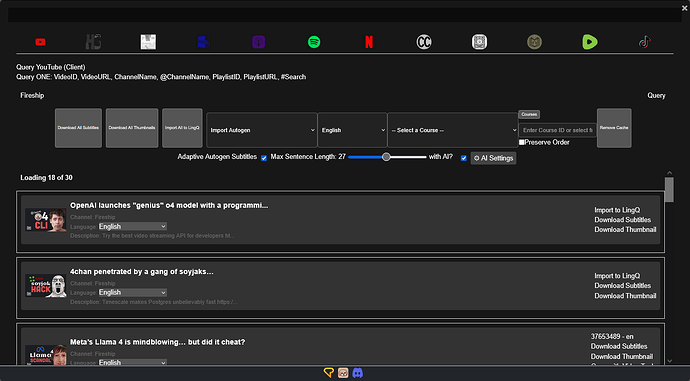Will the text formatting for imported subtitles ever be fixed? It has been like this since the beginning of the Youtube converter, and nobody seems to care. You only get a couple of words per line. Three quarters of the screen stay empty. This is not really feasible for reading. I can hardly click fast enough to keep up with the audio. Lingq keeps adding more and more fancy AI features while its most basic feature of being a text reader, displaying text, is still a problem. It doesn’t look like this when importing an ebook, where you get a good block of text. Why can subtitle imports not be formatted in a readable format.
Exactly. I also wish ebooks were better supported by the reader.
I have been aware of the issue myself but I never created a post highlighting this, so I thank you for actually putting it out there, so that maybe the right team can take a look at this
I have now switched to the free profile after many years of being a paid member. My good will is spent. There is such an egregious lack of quality control on this website. Lingq seems to present itself in two contradictory ways. On one hand, it is just the hobbyhorse of some lovable Canadian grandpa. Just a small team, everybody is giving their best but do not expect too much and on the other hand they want to be this legit commercial company that is charging you the same price as Netflix, the biggest streaming service in the world. Only that Netflix gives you international, multi-million dollar productions and Lingq gives you pages upon pages of unformatted text imports. The truth is, nobody should have to need to report an issue like this. It should have been noticed by the developers before the release. And I did point it out a long time ago, but here we still are.
I still like Lingq and strongly believe in the core idea. Should Lingq decide to start and take itself seriously as a company, I will most likely return.
- Will the wrong Pinyin in Chinese texts ever be fixed?
- Will the wrong word splitting in Chinese or Japanese texts ever be fixed?
- Will the wrong Furigana in Japanese texts ever be fixed?
- Will incorrect translations ever be removed or cleaned up?
Well, there is a reason it is as it is…it’s exactly how a multimillion dollar company called GOOGLE formats them. A company that also charges (unless you can stand the multitude of ads).
LingQ is just importing them as is, how Google formats them. They also are utilizing the timestamps that google has. So, if anyone is to blame, it’s Google.
Having said that, it would be fantastic if LingQ can reformat and regenerate the timestamps for you. It would be a great change. I personally do this on my own when I find Google’s formatting particularly egregious and I’m really wanting to go sentence by sentence. It adds a few minutes to my importing process so it would be nice not to have to do that.
How does this apply to subtitles? They are meant to fit on the screen, so obviously longer sentences will be broken up. This is the case for movies and series on Netflix, Amazon, iTunes etc., too. Subtitles aren’t meant to be worked with, they are just meant to be read.
But LingQ is a service that is intented to be used for working with text, and importing subtitles from YouTube and other sources is part of their advertising, so of course it is the obligation of the LingQ staff to provide proper functionality, if the subtitles are intented to be used in a way LingQ wants them to be, wheres Google and the like never aimed for that.
You are argueing as if @ramonek had complained about the breaks on his car weren’t working and you are countering that it is actually not the cars manufacturers fault, but the fault of the government not providing long enough straight streets for the car to roll out and stop on its own.
I’m not sure your analogy is great. I think it’s more like the brake manufacturer has made brakes for their own in house vehicle and the car manufacturer, for lack of a better option (make believe), has decided to use the brakes off of one of those spare vehicles that was left at the junkyard. OK, nevermind =)
My main point is there is a reason the way it is and it’s been like this forever. It does work. Not ideally. And it doesn’t mean there isn’t a reason to do what Ramonek propses…so I’m quite in favor. I probably would’ve just left a heart after the first post and not replied at all. Maybe there aren’t a lot of people who’ve asked for the change. I know I have…once, and I don’t think I’ve seen it asked for but a couple of times on the boards. So maybe it hasn’t been made a priority for the team. If someone gives me a button to spam request this, I’m all in favor!
It also has only been in the last year or two that Youtube’s autogenerated subtitles even had punctuation. So pretty hard to format that. With AI coming out recently that has been a possiblity now, and since then also google has added punctuation to the autogenerated subtitles. Not sure if that’s for every language, and if not, that could be an additional hinderance for the Lingq team. The channels that add their own subtitles seem to fair better in the formatting and tend to have more full sentences in their subtitle/timestamp groupings in my experience.
I understand your explanation and that Lingq is maybe not as responsible as I assumed when posting the comment. I assumed it was just another mistake. For me, actually following the audio in this way is definitely difficult. Being given approximately 20 seconds per page and frantically clicking and clicking to keep up with the spoken words is quite stressful. And that is on a big screen. On the laptop, forget about it. Additionally, you can never get a translation of a full sentence or even a larger word group because you cannot mark it and have it translated over a line break. So that is another Lingq feature that has been rendered dysfunctional.
Well, it is the way it is.
There’s a third-party program
This program uses AI to restore punctuation in captions while maintaining their original timestamps.
This is an example result of this program:
I don’t have any answers for this, but I would sometimes get less desirable results depending on the source imported from using the browser extenion.
I’m still using the browser-extension import button for things like Netflix series, but for YouTube videos I almost always now just get an audio file of the video (currently using the free version of ‘4K Video Downloader+’ to do that) and import it to LingQ using ‘Import’ → ‘Audio’. The transcript quality has not only been very readable and free of problems but also very accurate and matches what is actually being said. I guess the AI used for that has gotten quite good.
LingQ is not importing the subtitles in the YouTube (YT) video, they are importing the transcript file that YT provides. And that is also what many commercial apps are doing. YT has deliberately misconfirmed the transcript text so I user is forced to view the video in YT to get the full contents.
When you go to the YT video, the subtitles and audio are in sync.
If LingQ wants to solve this problem they must change their import process and forget about the transcript file, and instead dig into the video code and capture the subtitle details which must be included in there. After all, they are already getting the audio track from there.
I have to agree with the sentiment that they are spending time on AI and whatever while basic functions remain glitchy. Highlighting phrases does not always work, sentence view and audio not in sync, the browser extension does not import YouTube I ( know the MP3 converter route works, but still.) The organization of content, at least in Spanish, could be vastly improved. I see there is some new AI tab but I could care less about that. Not a fan of AI. I am looking for alternatives.


